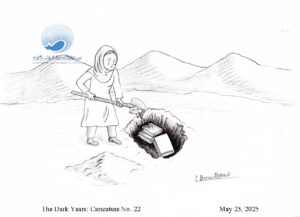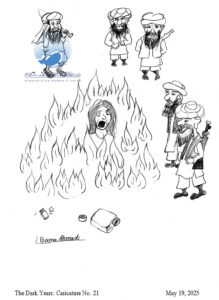Tales of the Dark Age (No 27)
By Zahra Hussaini, Translated by Shekib Jaghori
Description: This is a true story based on the lived experience of an Afghan woman under Taliban rule. For her safety, and the safety of her family, her name has been changed.
I had known her since childhood. There was a unique sweetness in her words, and whenever she was excited, a smile would blossom on her lips, and her eyes would shine with hope and dreams. Whenever despair crept into my soul and life seemed bleak, I would turn to her. Gulsoom was the only one who could speak about life with such passion, wiping away the darkness from my mind and planting hope within me.
Gulsoom graduated from high school before me and went on to study mathematics at the Balkh Teacher Training Institute. For years, she worked as a teacher in private schools and dedicated herself to the education and training of young people.
A few days ago, there was a gathering at my uncle’s house, which my mother and I attended. The room buzzed with noise and life—on one side, the children played, argued, and ran around, their laughter echoing through the house. On the other side, my mother sat with the women of the family, chatting, gossiping, exchanging old sayings, and occasionally bursting into laughter.
Then, I noticed Gulsoom, sitting alone in a corner, silent and lost in thought. I walked over and sat beside her. She looked broken, exhausted, and restless. Her face was pale, and her words, when she finally spoke, were bitter and heavy with sorrow. I couldn’t help but wonder—how could such a fragile body carry so much pain?
In the middle of our conversation, she let out a deep sigh and said, “We, the women of Afghanistan, are victims—victims of Taliban ideology. We are forced into marriage, bound to men with whom we share no understanding, and expected to endure it in silence. Tell me, is there a greater crime than being born a woman in Afghanistan?”
I had no answer. What could I say? No words came to me—I could only look at her with sympathy and sadness. Her eyes filled with tears, her throat tightened with emotion, yet she spoke without hesitation, as if she wanted every word to cut deep, to make me feel the weight of her suffering.
I sat there, speechless. She had always been the one to lift me up, to give me strength, to push me to fight through life’s struggles. And now? What words could comfort her? How could I ease even a fraction of her unbearable pain?
I looked closely at her face—it was as if she hadn’t smiled in years, as if her eyes had long forgotten what it was like to shine with joy. A sudden shiver ran through me. What had life done to her? Where had the warmth in her voice gone? That passion? That hope?
Where was the Gulsoom I once knew? Nothing of her remained. The woman sitting in front of me seemed like a stranger. I had heard she had married, but I hadn’t realized that she had lost herself in the process.
I remembered the day I found out about her wedding—the excitement I had felt, how much I had wished I could be there. I had imagined helping her into her white wedding dress, standing by her side, dancing with her, and celebrating her happiness. I had missed her so much. And now, when I look at her, I barely recognize her. My chest tightened with frustration, and my nerves burned with anger. Without thinking, I snapped, ‘Tell me about your husband—His name was Farid, wasn’t he?’
She looked me straight in the eyes, as if she, too, was surprised by my anger. There was something in her gaze—a quiet sadness that had settled deep in her tired eyes—that softened my rage. In that instant, my heart ached for her. It seemed she sensed that I was troubled. She broke eye contact and stared at the red-and-white patterns on the carpet before her. She sat silently for a moment before slowly and quietly beginning to tell me how she had met Farid.
As she spoke, I could see the weight on her shoulders begin to lift. The more she talked about him, the lighter she seemed to feel. A faint sparkle returned to her almond-shaped eyes, and a soft, almost mysterious smile appeared on her thin lips. The color returned to her pale face, and a blush crept across her cheeks. She leaned closer to me, as if she wanted to share a secret with me, and whispered close to my ear, “When I saw him for the first time, I thought, ‘This is my destiny. I must love him; I must fall in love with him.’ But my foolish heart couldn’t have known it would turn out like this.” She sighed, then added, “Let’s not talk about it. I’m not the same girl anymore. Marriage has aged me. In our society, families just don’t want a bride—they also want a servant. My job is to serve my husband’s entire family.” Then, with a tone of complaint, she said that her husband lacked decision-making power, showed no concern for their shared life, and had no sense of responsibility.
Golsoom recounted the struggles and disappointments that had crushed her, how every door seemed closed, and how she had contemplated ending her life multiple times. She had even planned it—each time believing it was the only escape. But at the very last moment, something always stopped her—a flicker of hope, a small light in the darkness. And so, she convinced herself to hold on a little longer, to keep searching for another way out.
As we talked, my uncle’s wife suddenly raised her sharp voice from across the room and said: ” Gulsoom, it’s been four years since you got married. Why haven’t you had a child yet? You don’t even work as a teacher anymore. There’s an old saying: ‘Having a girl is better than sitting idle.” Everyone burst into laughter. Golsoom forced a faint smile but quickly retreated into silence, her mind drifting elsewhere. She was used to the taunts and sarcasm, so she chose not to respond.
The heavy silence stretched on, and finally, I asked, “Why don’t you get a divorce?” She sighed and said, “I’ve tried several times, but under the Taliban’s rule, everything favors men, and women are seen as nothing more than child-bearers. Two years ago, I wanted a divorce. I told Fareed our life together would never work and that it would be better for us to separate rather than destroy each other like termites gnawing on the wood. But do you know what he said? he uttered something that shook me. Without hesitation, he warned, ‘If you try to divorce me, I will do what I did before—I will hand your brothers over to the Taliban again. And I will marry you off to one of their fighters.’” My whole body trembled. How can someone be human—be your husband—yet torment you, refuse to divorce you, and even threaten to marry you off to Taliban fighters?
Gulsoom spoke of more memories and the dark moments of her life. She recounted a scorching summer day: “That day, I had asked my husband for permission to visit my sister. Her house was only ten minutes away. I had just arrived when Fareed called, his deep voice booming through the phone, ordering me to return home immediately. Fear gripped me. My hands and feet trembled. I clenched my fingers into fists, pressing them tightly together, and a prickling sensation ran through my legs. I quickly put on my black chador and rushed out of my sister’s house. As soon as I stepped into our yard, a sharp slap landed on my face. It was Fareed. I fell to the ground. The moment I tried to stand; another slap struck me—this time it was Fareed’s father. Then, both of them started hitting, punching, and kicking me nonstop. As they were beating me suddenly, the thought of escape flashed through my mind. I ran to my room, shut the door, and cried until nightfall.”
“In the evening, when the house grew quiet and everyone had gone to their rooms, I snuck out and made my way to my father’s house, which wasn’t far away. My father was still at his bakery. My mother opened the door, and I ran into her arms, sobbing. We sat silently, crying together in a corner of the yard for hours. When my father returned home from work and saw me, he looked startled. ‘Gulsoom, my child, is everything alright? Has something happened?’ he asked.”
“With a trembling voice and tears, I said, ‘Father! I can’t live with Fareed anymore. These four years have been nothing but torture for me. He beats me—not only he but also his father. His whole family insults me. This is not life; this is hell.”
“My father called my two brothers—both married and living in separate homes—to come over and find out what was going on. Just as they arrived, a loud knock echoed from the yard door. My father called out, ‘Who is it?’ A voice responded from behind the door, ‘We are from the Islamic Emirate.’”
“My mother collapsed in a corner, and I was frozen with fear. My eldest brother went to open the door. Four Taliban fighters entered, accompanied by Fareed and his father. First, they handcuffed my eldest brother, then my second brother. Both were forced to sit on the floor. My father and I watched from the cellar door, his walking cane trembling in his hand. He was shaking. Trying to suppress his anger, he asked calmly, ‘Qari Sahib, what’s going on?'”
“One of the Taliban of medium height, with a long beard and dressed in traditional white Afghan clothing—his entire presence radiating malice, shouted: ‘Your daughter wants a divorce? Doesn’t she know that in Islam, a woman has no right to ask for a divorce? You are supporting the infidels and Western countries, and you want to bring foreign practices into an Islamic nation!’
Then they forced my father and two brothers into their Ranger vehicle and took them away. We heard nothing from them until the following day. My uncle went from one police station to another searching for them, and finally, in the afternoon, he brought them home. Their hair was disheveled, their faces bruised and bloodied. Their clothes were torn and soaked in blood. The Taliban had thrown them into a “container” and beaten and tortured them. The Taliban told my father that his daughter was not allowed to divorce her husband. If I insisted on divorce, they said, they would force me to marry one of their fighters. It’s been two years since that day, and all this time, I’ve remained silent to protect my father and brothers from further harm. I’ve been quiet, obedient, and followed every order. I became a robot serving the master of the house. Because I am a woman, and this is Afghanistan, a place where women are not considered human. She has no rights. In this part of the world, a woman is the most dehumanized creature alive. Her life and death mean nothing. Her existence, her pain, her future, and her dreams—they mean nothing. Under Taliban rule, do women even have the right to dream?”
We didn’t get to talk for long. Gulsoom left, and I was left alone, thinking about her pain and sorrow. It’s been four years since she got married. Four years of merely surviving in her husband’s house. And in all that time, she hasn’t lived a single happy day, nor heard a single word of kindness.









